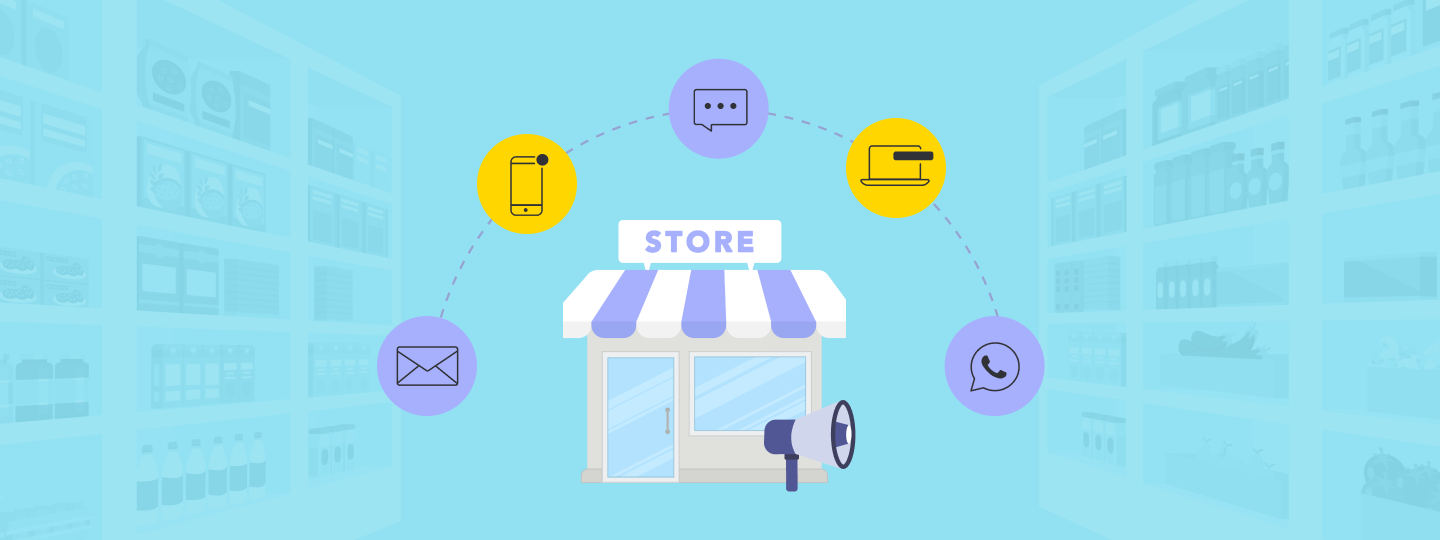The ongoing digital revolution and the emergence of new-age technologies have drastically transformed traditional business models over the last decade. This rapidly evolving business environment makes it extremely difficult for companies to sustain differentiation solely based on pricing or the products it offers. Modern-day companies must dig deeper and explore possible opportunities to enhance their customer experience and maintain an edge over their competitors. And WhatsApp Business API is the answer to most hyper-personalization woes.
According to a report published by PwC, consumers are willing to pay 16% more for products or services from businesses that provide an exceptional customer experience. The same report also highlights that 1 in 3 consumers will walk away from a brand they love after just one bad experience. Evidently, businesses need to provide exceptional customer experiences to grow and sustain competitive differentiation. If organizations deliver the experiences customers want, customers will reciprocate with loyal and long-lasting relationships.
Consumers are willing to pay 16% more for products and services from businesses that provide an exceptional customer experience! Read more - via @webengage Share on XIn today’s multi-channel world of voice calls, email, chats, and messages, consumers prefer interacting with brands the same way they communicate with their dear ones. More users are increasingly leaning towards using messaging apps to reach out to brands. As a result, some popular messaging apps like WhatsApp, Telegram, Facebook messenger, Viber, and WeChat are becoming the preferred communication channels. Among these applications, WhatsApp marketing has grown tremendously over the years and is currently crowned as the most popular messaging channel, with billions of active users across 180 countries.
The popularity of WhatsApp
According to a recent Statista research, WhatsApp has been rated as the most popular messaging channel worldwide, based on the total number of Monthly Active Users (MAUs). With more than two billion people using WhatsApp, this popular instant messaging channel has unfolded numerous opportunities for brands to connect and communicate with their end-users.

Taking notice of its rising popularity and enormous business potential, the instant messaging brand launched WhatsApp Business to help small, medium, and large-scale businesses engage with its customers and market their brand.
The introduction of WhatsApp Business API has opened up a new avenue for businesses to connect with their customers. Brands can create a unique experience for each customer and further enhance customer engagement by adding WhatsApp as an additional channel as part of their multi-channel communication strategy.
How WhatsApp Business API can be a game-changer across various industries?
An instant messaging application like WhatsApp can help businesses have a more significant impact on customer satisfaction. Brands can expand their reach, improve message deliverability rate, have secure conversations with their customers, increase conversions, and also achieve some of their critical business goals. WhatsApp Business API can undoubtedly be a game-changer and help them have a competitive edge.

Here are some reasons why modern-day businesses should consider using WhatsApp Business for their customer communication:
1. Injects brand personality with every interaction
Strengthening brand relationships with customers is the holy grail for most businesses. WhatsApp delivers on that promise by providing brands with a secure, personal environment to have one-on-one communication with their customers. WhatsApp also gives ample space for businesses to market their brand during their interaction with consumers. By allowing brands to create business profiles, WhatsApp helps in infusing a unique brand identity with every conversation.
2. Connects with customers on their preferred channel
Successful brands understand that to deliver fantastic customer experiences; they have to be on the channels their customers prefer. A survey conducted by Nielsen shows that 56% of consumers prefer messaging a business than calling a customer service.
SnapTravel, one such forward-thinking company, uses WhatsApp Business to interact with its customers. The brand allows its customers to find and book hotel rooms on various messaging platforms. It has recently included WhatsApp in the mix due to its wide popularity. Including WhatsApp as an additional communication channel has allowed SnapTravel to be present where their customers already spend most of their time. The channel also provides customers with the ability to message SnapTravel the same way they message a friend.
3. Enables real-time conversations
Customers prefer having real-time conversations with brands and not just responding to one-way messages directed at them. WhatsApp addresses this issue by delivering a high-quality, reliable two-way messaging service around the world.
Industries using WhatsApp Business API to strengthen their omnichannel user engagement stack
WhatsApp Business can become a powerful communication channel for user engagement, particularly for large-scale organizations that serve a wider audience. More than three million organizations worldwide are using WhatsApp Business, and approximately 84% of small and medium businesses confirm that they actively communicate with their end-users through this messaging channel.
Here are four popular industries that use WhatsApp as one of the primary channels to communicate with their customers:
E-commerce
As E-commerce companies have limited face-to-face customer interaction, they need to make their online interactions instant and powerful. By mapping their customers’ journey, finding opportunities at each phase, and enabling personalized customer service through instant messaging channels, E-commerce brands can build a stronger relationship with their customers and provide them a better shopping experience.
WhatsApp Business API enables E-commerce companies to meet the growing expectations of today’s customers seamlessly.
Let’s take a look at some ways E-commerce businesses can use WhatsApp in the communication strategy.
1. Address customer queries
E-commerce businesses receive tons of customer inquiries each day about their products and services. Responding to these queries can be challenging for the customer support team. However, with WhatsApp Business API, all the commonly asked user queries can be answered and sent in the form of messages to the consumers who have opted-in for WhatsApp notifications. This way, the customer service team will be able to manage other business-critical tasks.
2. Recommend Products
E-commerce brands can use WhatsApp to help customers pick products that fit their needs. Consumers can connect with e-commerce brands through WhatsApp and message their requirements. The customer service team can then set up automated responses to display relevant products using images and videos. Or recommend more products based on the user’s search or purchase history.
3. Provide delivery updates
From the moment customers place their order, e-commerce companies can share a real-time delivery update via WhatsApp until the order is delivered. The two-way communication channel also allows customers to clarify all their queries related to the order delivery by instantly connecting them with the support team.
Let’s look at how OTTO, a famous European e-commerce brand, used WhatsApp Business to cut down its manual efforts by 15%.

OTTO wanted to improve its customers’ shopping experience by strengthening its support channels. The e-commerce brand decided to have a direct dialogue with its users by providing a user-friendly channel that they could use to interact with the support team instantly. The brand even trained its customer support team to handle WhatsApp requests after integrating WhatsApp Business API into their systems.
With WhatsApp, OTTO’s customer support team could personally interact with users, thereby resolving their issues more quickly. There was a 15% decrease in the average handling time for customer requests.
Healthcare
The advancement of digital communication plays an indispensable role in healthcare management. With an increase in demand for quality healthcare services, telehealth solutions are becoming more critical. Today, the healthcare sector focuses on faster and more reliable communication platforms to deliver unified healthcare solutions.
WhatsApp can act as a medium and facilitate several essential requests. From sending appointment confirmations/reminders, prescription updates, and medical test reports to sharing insurance processing and outstanding balance updates. Healthcare providers can provide instant resolutions to the queries of each patient, regardless of the geographical location of the patient and the time of the day. These personalized responses help healthcare companies establish a strong bond with their patients and win their trust.
Here is an example of how MFine, a digital healthcare platform in India, uses the WhatsApp Business API to deliver a fantastic user experience to its customers.
MFine is an on-demand, digital, primary healthcare platform that offers professional diagnostics and health check-up services. The healthcare brand wanted to provide its customers with a premium digital experience. Integrating Kaleyra’s WhatsApp API into MFine’s platform helped them extend their reach to all the patients using WhatsApp. MFine now instantly addresses customer queries, sends timely reminders about doctor appointments and prescription refills, and shares the lab test results and reports directly with patients via WhatsApp.
Online Travel Agencies
The increasing competition in the travel industry has put Online Travel Agencies under immense pressure to show customers the added value they bring beyond price. OTA’s must shift their focus in travel marketing from merely getting a booking to looking at the entire customer journey. At every step of a traveler’s journey, OTAs have an opportunity to add value, engage with them, and even increase revenue earning opportunities beyond ticket bookings.
Adding WhatsApp to their communication suite will make OTAs a more reachable and better-connected host and travel partner. OTAs can carry out the entire customer journey end-to-end via WhatsApp.
For instance, consumers can initiate a ticket booking inquiry with a simple WhatsApp message, and the OTA’s support team can respond with seat availability and prices. After consumers share their preferences, OTAs can help them with the booking by sharing a link to make the payment, confirm the booking, and then share the tickets via WhatsApp. Before boarding the flight, the customers can even enquire about the flight status and other details, all via the same platform.

Travelstart, a popular online travel portal in the MEA region, uses WhatsApp Business API to offer customer support. Customers can get answers to their common travel queries via the company’s WhatsApp Business account. The brand aims to provide its customers with affordable travel plans along with a convenient and straightforward travel booking experience. By using the WhatsApp Business Solution, Travelstart is doing precisely that – putting customer’s convenience and support first.
BFSI
Digital innovation, fierce competition, and increasing customer expectations are transforming the banking and financial services sector. To thrive in such an environment, organizations must find innovative ways to offer unique services that tap unmet customer needs.
Including channels like WhatsApp in their communication strategy will allow BFSI companies to efficiently manage customer conversations. Giving them a holistic view of their interactions, and thereby helping them assist their customers better.
Be it updating KYC, assisting customers in the account opening process, or something as critical as reporting fraud, the BFSI sector can use the WhatsApp Business Solution to streamline their operations and make it convenient for their stakeholders. Banks and financial institutions can also use this channel to notify and keep their customers informed for processes such as OTP authentication, transactional alerts, portfolio updates, policy renewal reminders, trade summaries, and so much more.
Here’s an instance of how Prestivalore, an Italy-based credit lending company and a client of the global CPaaS provider Kalyera, uses WhatsApp Business API to process loan applications.
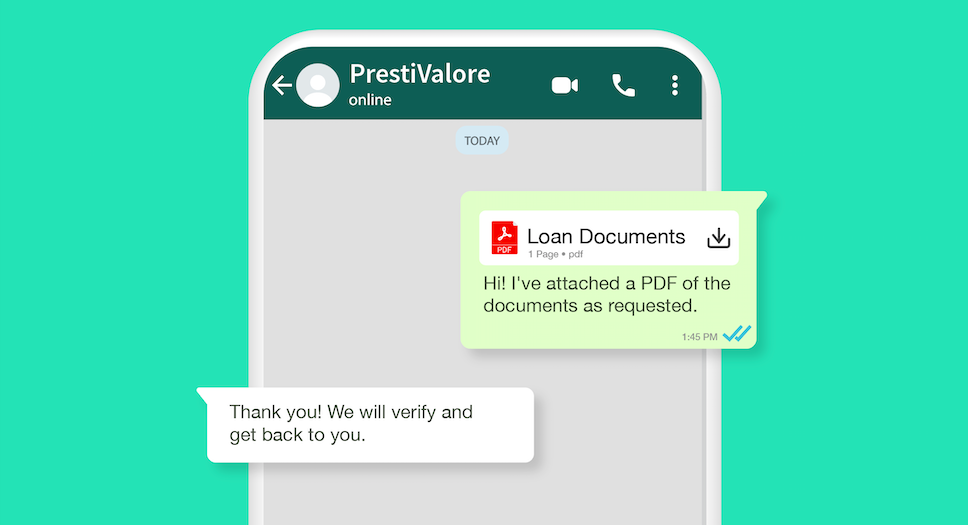
PrestiValore wanted to streamline its credit consultation process. Also, efficiently review the loan application requests to help its consumers obtain a loan in a hassle-free manner.
After integrating WhatsApp Business API, the brand could effectively manage the entire application, review, and approval process. Prestivalore witnessed a significant increase in the number of people requesting loans via WhatsApp. The lending firm also simplified the document submission procedure for C-ID validation and loan eligibility review. It enabled their customers to send a copy of the required files such as personal IDs and salary slips via WhatsApp messages.
The future developments in WhatsApp Business API
WhatsApp continues to improve its platform further by adding new features. By expanding the range of services it offers to businesses, it is increasingly being seen as a platform that enables conversational commerce. Not just as a communication channel.
In 2020, Facebook made a $5.7 billion investment in Reliance Jio. Following the deal, the customers of JioMart could transact seamlessly through WhatsApp by placing orders from local stores. With this partnership, industry experts are certain that WhatsApp will play a significant role in the Indian retail space.
Final Thoughts
There is a clear relationship between a customer’s experience and their loyalty towards a brand. Successful user engagement will lead to increased customer loyalty. More buyers returning to their favorite brands give businesses a better chance to drive more sales.
The present conversational era requires businesses to optimize their engagement with customers across multiple channels. Different customers will have different communication preferences. Therefore, an organization’s multi-channel communication strategy must enable these different touchpoints to work together in numerous ways. It should support their customer’s preferred journey. More so, provide convenience and accessibility for customers to interact over the channels they want to use.
With its extensive reach, highly engaged user base, and rich communication capabilities, WhatsApp has become a favorite channel for businesses. More organizations must consider adding WhatsApp to their communication strategy. It can strengthen their multi-channel user engagement initiatives. It helps earn customer loyalty by enabling them to respond to customer queries and provide constant support instantly.



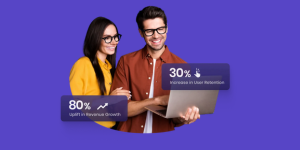
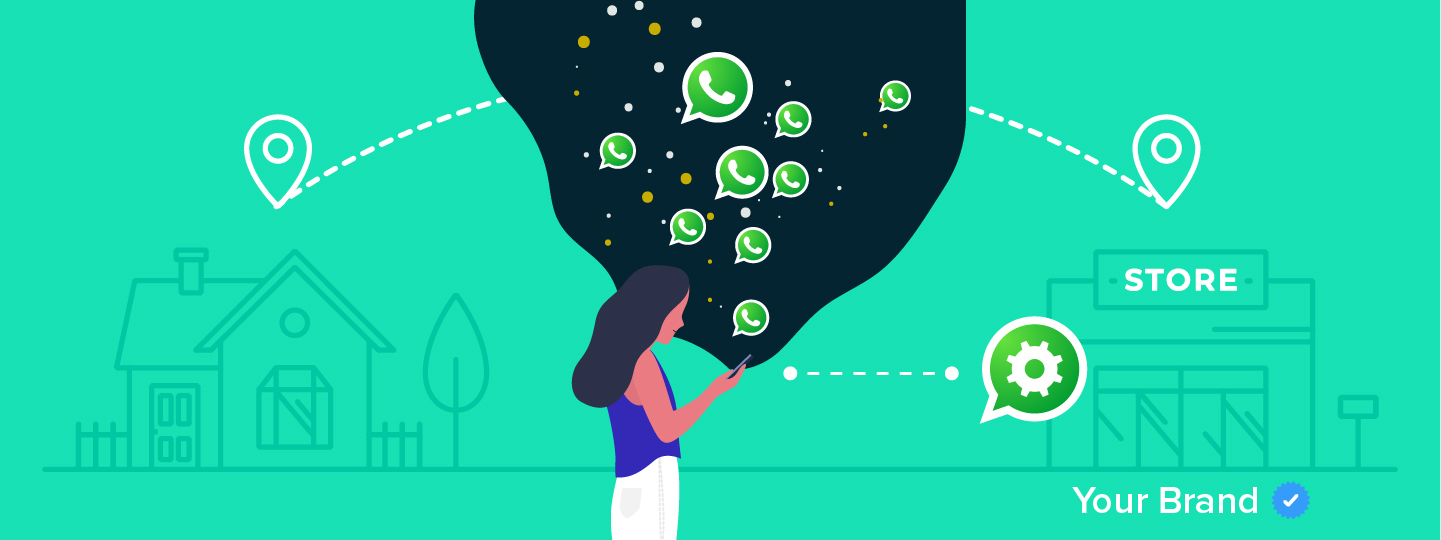

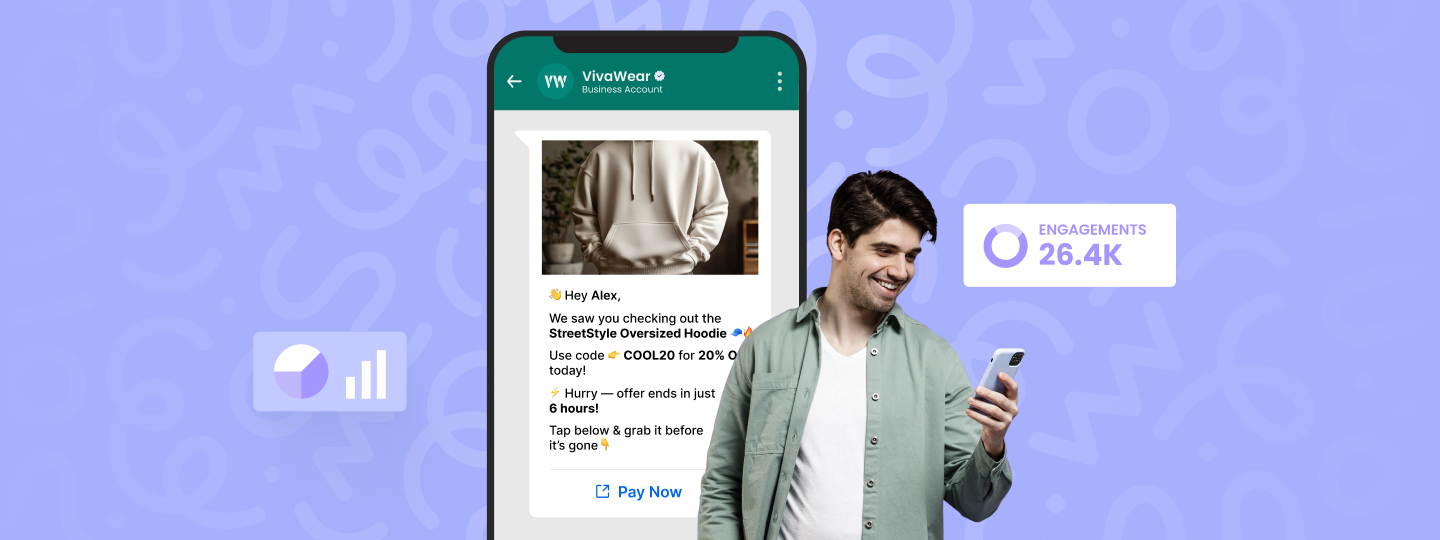
 Prakhya Nair
Prakhya Nair
 Diksha Dwivedi
Diksha Dwivedi